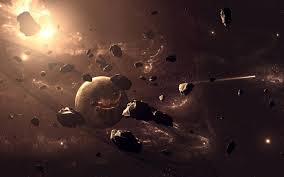As I had mentioned in Big History, I had zeroed in on Bill Bryson’s A Short History of Everything as my primary source of getting to know more about the subject. I’m halfway through the book and the content provided by the book so far has been so vast and so diverse that I felt it more appropriate to update about it in a series of posts. Devoting a single post to the history of everything didn’t seem to do the book justice, so there.
Firstly, the book does live up to the hype and its ratings. I spent a huge amount of time in middle school reading up Horrible Science books. As a result, I am in possession of a large mental repository of facts about science and scientists that are usually not found in science textbooks. After going through three hundred odd pages, I realized how much I didn’t know about stuff that ought to be known by everyone. How is the age of the Earth and the Universe calculated? Why and how were the dinosaurs suddenly wiped out from the face of the planet? And some of the facts the book stated were really bizarre. Isaac Newton wrote the Principia when a fellow astronomer, Edmond Halley asked him about how and why the earth revolved. Apparently, Newton had formulated his laws of motion and the universal law of gravitation decades ago. He simply didn’t bother to publish his results. It was only upon the insistence of Halley that he wrote the book and became, arguably, the greatest scientist the world has ever known.

If there were a comet or an asteroid approaching our planet, we wouldn’t be aware of it until two weeks before it was due to collide and by then, it would be too late to do anything. Essentially, if there was an asteroid approaching our planet, we would be in the dark (quite literally) about it and the havoc it would create on colliding with the planet i enough to end the human race as we know it. And considering there are hundreds of thousands of asteroids in our system, every moment we live might be our last. Terrifyingly fascinating, isn’t it?
It is facts like these, backed up by credible scientific research and evidence that makes Bryson’s book such a compelling read. So far, I have read about the Big Bang, the Universe, the Galaxies and our Solar System. You may feel that you have adequate knowledge of the aforementioned topics but it is only after reading chapters dedicating to these topics due you actually grasp the magnitude of your ignorance (at least in my case). Did you know, for instance, that until very recently the Earth was believed to be only a few million years old? Or that the first dinosaur fossil found was discarded as the discoverer couldn’t grasp its importance?
Bryson’s later chapters are devoted to the planet we live on and broadly gives an overview of the planet from the viewpoint of two subjects: Chemistry and Geology. After reading the chapter on Alchemy, Chemistry and the Elements, I kind of grasped as to how cruel and unfair the world of science can sometimes be. Some of the greatest geniuses who ever lived are not even mentioned in scientific literature. Take Swedish Chemist Carl Scheele, for example. This man independently discovered eight elements including hydrogen, oxygen and chlorine. But he is not given credit for it. The majority of the world doesn’t even know his name.
I’ve never been a fan of Geology or Geography but the fact that I went through almost a dozen chapters dedicated to them effortlessly speaks of the effortless ease with which the author conveys major ideas to us. Although it is highly unlikely that I will pick up a book on Geology as a follow-up, I can confidently say that I know enough to discuss a few topics with a geologist over a cup of tea.
The latter half of the book covers Biology and Evolution and I’m sure it will be an even more exhilarating read than the former. I liked Biology at one point of time. I have a feeling I still do. I maybe just halfway through the book but here’s one piece of advice I’d give to anyone who wants to know about how the universe and the world works: read the book. Trust me, it’s worth it. Every single page of it.












